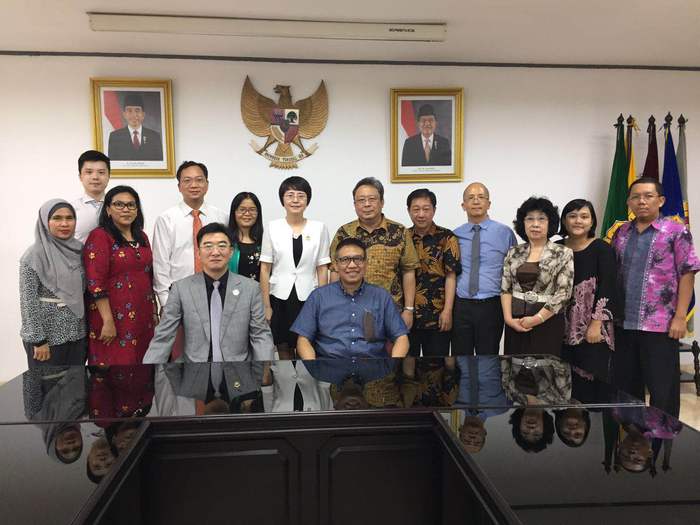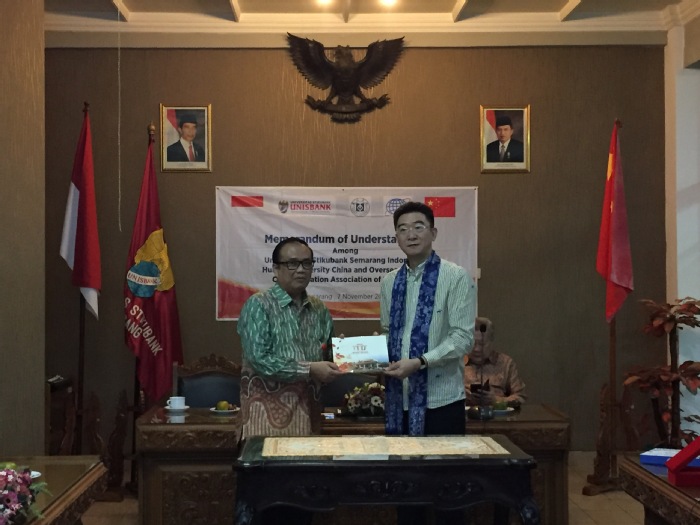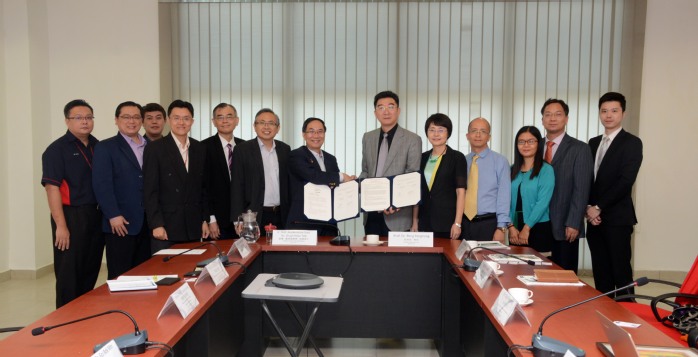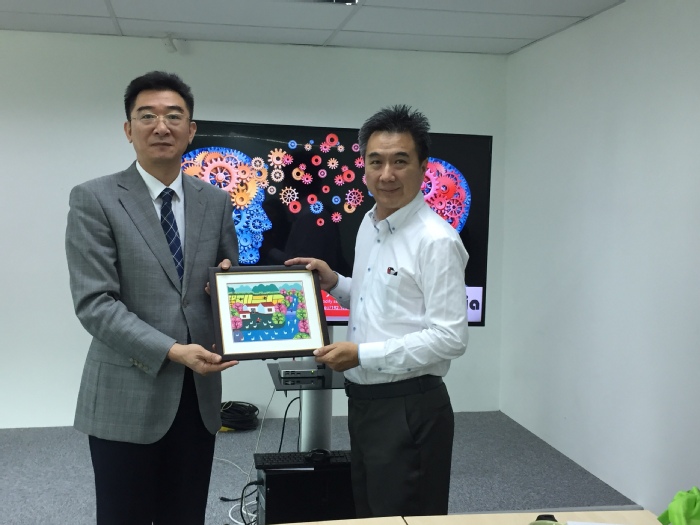President Peng Yonghong Visited Indonesia and Malaysia
2017-11-17
To further enhance educational cooperation with countries along “One Belt One Road”
initiative, broaden international cooperation channels and promote scientific research,
HZU delegation, led by President Peng Yonghong, visited cooperative universities and a
company in Indonesia and Malaysia from 5thto 12th, November.
From 6thto 8th, the delegation visited UNIVERSITAS DARMA PERSADA (UNSADA) in Jakarta
and UNIVERSITAS STIKUBANK (UNISBANK) in Semarang respectively. On 6th, the delegation
was received by Ismadji Hadisumarto, the First Chairman Board of Executive, Rector Dr.
Haji Dadang, Vice Rector Dr. Eko Cahyono and other representatives from UNSADA. In the
meeting, Dr. Eko Cahyono introduced that established in 1986, UNSDA was the first private university in Indonesia authorized to offer Chinese as an undergraduate major and now has
Faculty of Letters, Faculty of Engineering, Faculty of Marine Technology and Faculty of
Economy, among which Chinese, English and Japanese majors are offered by Faculty of
Letters. He said that in the past few years teachers from China’s cooperative universities
have come and taught Chinese and Chinese culture with counterparts in UNSADA, receiving
high appreciation by students; however, with the increasingly mounting numbers of
students who request for Chinese language and culture learning, the supply of teaching
resources in UNSADA is falling short of demand. Thus, he sincerely wishes to build up
stable and long-term cooperation with China’s universities, so as to strengthen and
improve the level and scale of Chinese Language Teaching in UNSADA.

In the afternoon of 7th, the delegation arrived in UNIVERSITAS STIKUBANK and was warmly welcomed by Rector Dr. Haji Hasan, Vice Rector Dr. Sugeng Purwanto and Faculty
administration. Dr. Haji Hasan introduced that established 1968, UNISBANK is one of the
most important private universities in Semarang, whose mission is to serve and boost
Indonesia’s economy and education philosophy is to cultivate students’ innovative and
entrepreneurial spirit and application abilities. At present, the University has Faculty of
Economics and Management, Faculty of Information Technology, Faculty of Law, Faculty of
Arts, Faculty of Engineering and Faculty of Tourism. He said that the University actively
engages in international cooperation, especially hoping for building up cooperation with
China’s universities, through which to improve faculty’s teaching abilities and broaden
students’ international. In doing so, the University could upgrade its overall competiveness
and strive for becoming an internationally well-known university in 2028.

In two discussions with the visiting universities, President Peng gave brief introduction of
Guangdong Province and Huizhou City, emphasizing on Huizhou University’s history, status
quo of teaching and research, internationalization and future development. He said that in
the past several years HZU has accumulated valuable and rich experience of teaching
Chinese languages and organizing various kinds of activities that promote Chinese culture
through receiving batches of short-term students from the USA, Canada and Japan.
At present, the University is actively participating in Education Act Plan for Belt and Road
Initiative, planning to conduct cooperation with Indonesia’s universities in the areas of
Chinese language and culture learning. Specifically, HZU is able to send students majoring
in Teaching Chinese to Speakers of Other Languages to Indonesian cooperative universities
as Chinese teachers or teaching assistants, offering quality teaching experience and
organizing a wide range of activities for Indonesian students to better learn Chinese
culture. Meanwhile, HZU will work out plans for receiving students from cooperative
universities for short-term language and culture study, so as to co-promote education
internationalization. He sincerely wished that all parties work together with pragmatism,
finalize all related details and materialize the cooperative projects.

Having finished the planned visits in Indonesia, the delegation set off to Malaysia on 8th
for three-day visit. On 9th, the delegation visited Sunway University and was cordially
received by Vice-Chancellor Professor Graeme Wilkinson, Deputy Vice-Chancellor Professor
Pua Eng Chong and other representatives. This was the first time that HZU had visited
Sunway University since Sunway University’s coming to HZU in this May when preliminary
cooperation agreements were achieved. In the meeting, Professor Wilkinson introduced
that Sunway University, after 30 years’ exploration and expansion, has become one of the
most influential private universities in Malaysia, credited by various internationally
authoritative assessment institutions due to its education quality. The University highly
values internationalization, cooperating with Harvard University, Columbia University,
Oxford University, Cambridge University, University of Lancaster, France Blue Ribbon
Culinary Institute and other renowned institutions. He sincerely hoped that this visit will
set a milestone for two universities’ future cooperation.
President Peng said that Malaysia is an important country along the “Belt and Road”
initiative, whose higher education enjoys high degree of internationalization. To cooperate
with Sunway University not only responses to the call of China’s policy, but also boosts
HZU’s education internationalization. As a local university, HZU is actively responding to
the requests from government, society and enterprises through adjusting its major
structure, research and directions of talent cultivation, striving for upgrading its capabilities
of serving regional social and economic development. Two universities can conduct
cooperative programs from two aspects. With respect to teachers’ programs, researchers
at HZU whose research field matches with their counterparts at Sunway University will be
encouraged to come to Sunway University for conducting collaborative research. As to
students’, given the fact that both two universities share common ideas regarding
cultivating application-oriented talents, programs that integrate classroom study with field
practice can be co-developed for HZU students. Huizhou University also welcomes students
at Sunway University to come and study. As the highest educational institution in Huizhou,
HZU will provide students in Malaysia, especially whose origin is Huizhou, with a chance to
find out Huizhou’ economic, social and cultural development through classroom study and
cultural visit, which would significantly enhance their understanding of their hometown.

On 10th, the delegation arrived at UNIVERSITI TUNKU ABDUL RAHMAN (Sungai Long
Campus) and was warmly welcomed by President Ir. Professor Academician Dato’ Dr.
Chuah Hean Teik, Vice President Professor Ir. Dr. Ewe Hong Tat and other representatives
from administrative units and academic faculty. Professor Chua introduced that UTAR
established in 2012 and now has become a leading university in Malaysia due to its
advanced facilities, internationally renowned research capability and high quality teaching.
In addition, UTAR is home to research on Chinese culture, traditions and language in
Malaysia, playing an indispensable role in Chinese culture’s preservation and inheritance. He
hoped that all-round cooperation can be conducted between two universities. President
Peng introduced the basic conditions of Guangdong and Huizhou and gave an overall
introduction of HZU’s status quo, expressing his admiration for UTAR’s effort to study and
advocate Chinese culture. He said that as a highly internationalized university with advance
education ideas and outstanding teaching and research abilities, UTAR is an ideal destination
for HZU students’ oversea study. He also encouraged researchers and scholars with similar
fields and interests should conduct collaborative research and promote China’s culture
together.

On 11th, the delegation visited EV-Dynamic (EVD) in Kuala Lumpur and warmly received by
CTO Ng Kam Sin, Senior Manager Dr. Kwong Kae Hsiang and HR Manager Miss Ellis. Dr.
Kwong introduced that EVD is a company capable of independent research and
development on integrated information system, mainly providing information solutions in
areas of telecommunication security, intelligent transportation, railway engineering and
medical systems. At present, EVD is undertaking lots of national projects in Malaysia and
keeping sound relationships with CRRC, ZTE and other famous companies in China. CTO
Ng Kam Sinsaid that with the development of the company, collaborating with China’s
universities in terms of technological research and talent cultivation has become an urgent
task. On one hand, the company will be given chance to learn China’s cutting edge technics;
one the other hand, the company can nurture talents for its future development through
university-company collaboration. President Peng gave a detailed introduction of the
Innovation Center established by School of Information Science and Technology concerning
its operation and achievements thus far, pointing out that the orientation of cultivating high
quality application-oriented talents and encouragement to seamlessly connect with demand
by markets will be increasingly prominent with the deepening of the University’s
transformation development.HZU will consider the construction of a collaborative
innovation center with EVD andsincerely invite EVD to HZU to have thorough
communication and discussion regarding the future cooperation.
In this visit, HZU has signed MoU with UNSADA, UNISBANK, Sunway University and UTAR,
further promoting international cooperation and enriching cooperation programs. The
decided and coming cooperation programs will facilitate the construction of international
internship bases and collaborative innovation centers, which will significantly benefit the
cultivation ofhigh quality application-oriented talents and the University’s transformation,
as well as boosting its international reputation.

